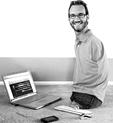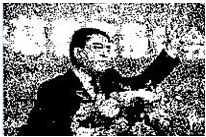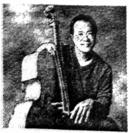题目内容
 IMAGINE a life without arms or legs! You can’t hold anyone in your 26 . You can’t walk anywhere with your feet. How would you last a day like that? Would you 27 at yourself in the mirror like Nick Vujicic, the 29-year-old Australian?
IMAGINE a life without arms or legs! You can’t hold anyone in your 26 . You can’t walk anywhere with your feet. How would you last a day like that? Would you 27 at yourself in the mirror like Nick Vujicic, the 29-year-old Australian?Nick was born without limbs(四肢), so life was not 28 for him. At school many students played jokes on him 29 he looked different from everyone else. He was refused to be 30 friends, so he always felt 31 . However, he faced that bravely. He 32 to type and write with two toes(脚趾)at the age of six, and he could 33 s
 urf and play golf. In college, he achieved great success and was among the 34 students in the studies. And he decided on 35 to do later in his life—to encourage others to work hard for their dreams.
urf and play golf. In college, he achieved great success and was among the 34 students in the studies. And he decided on 35 to do later in his life—to encourage others to work hard for their dreams.Now Nick is one of the most popular 36 in the world. He travels to many countries and gives speeches about his story 37 difficulties. “Living life fully is about looking at what you 38 , not what you don’t have.” he said. His 39 encourages millions of people.
“I tell people to keep on getting up when they 40 and to always love themselves,” he said. “If I can encourage just one person, then my job in this life is done.”
| 小题1: |
|
| 小题2: |
|
| 小题3: |
|
| 小题4: |
|
| 小题5: |
|
| 小题6: |
|
| 小题7: |
|
| 小题8: |
|
| 小题9: |
|
| 小题10: |
|
| 小题11: |
|
| 小题12: |
|
| 小题13: |
|
| 小题14: |
|
| 小题15: |
|
小题1:A
小题1:C
小题1:B
小题1:A
小题1:C
小题1:C
小题1:D
小题1:A
小题1:D
小题1:C
小题1:B
小题1:D
小题1:B
小题1:A
小题1:A
【主旨大意】本篇短文讲述没有四肢的澳大利亚人Nick Vujic ic如何自强不息,和困难作斗争,以及他用自己的故事鼓励了更多的人的故事。
ic如何自强不息,和困难作斗争,以及他用自己的故事鼓励了更多的人的故事。
小题1:本句句意:你不能拥抱任何人;hold sb. in one’s arms符合句意。
小题1:本句句意:你会像29岁的澳大利亚人Nick Vujicic一样对着镜子中的自己笑吗?smile at sb.意为“对某人笑”,符合句意;注意:laugh at sb.意为“嘲笑某人”。
小题1:没有四肢的人生活自然不容易(not easy)。
小题1:句意为:在学校,很多学生开他的玩笑因为他看起来与其他每一个人不同。此处前后句之间是因果关系,应该用because连接句子。
小题1:根据上句可推出本句句意:他被拒绝成为他们的朋友;应该用their friends。
小题1:由前句可知“他没有朋友”所以总是感到寂寞(lonely)。
小题1:fail to do sth.意为“干某事失败”,forget to do sth.意为“忘记做某事”,help to do sth.意为“帮助做某事”,learn to do sth.意为“学会做某事”。此处表达的是“学会打字”,应该用learn to type。
小题1: 本句句意为:他甚至会冲浪和打高尔夫球。even意为“甚至”,ever意为“曾经”,never意为“从不”,hardly意为“几乎不”,应该用even。
小题1:由之前“achieved great success”可推出“在学习方面,他属于最优秀的学生之中”,用excellent(优秀的)符合句意。
小题1: 由后句“to encourage others to work hard for their dreams”可推出:他决定了余生该做什么事,用what to do。
小题1:由其后的“gives speeches”及他所说的话可推出他是speaker(演讲家)。
小题1:“和困难作斗争”用against difficulties。
小题1: 由后句“not what you don’t have”可推出是what you have。
小题1: 前面已经提及“his story against difficulties”,所以此处应该用story,本句意为:他的故事鼓励了成千上万的人。
小题1:该句句意为“我告诉人们当他们跌倒的时候要继续爬起来。”与“keep on getting up”相对应的是fall(跌倒)。故选A。
 ic如何自强不息,和困难作斗争,以及他用自己的故事鼓励了更多的人的故事。
ic如何自强不息,和困难作斗争,以及他用自己的故事鼓励了更多的人的故事。小题1:本句句意:你不能拥抱任何人;hold sb. in one’s arms符合句意。
小题1:本句句意:你会像29岁的澳大利亚人Nick Vujicic一样对着镜子中的自己笑吗?smile at sb.意为“对某人笑”,符合句意;注意:laugh at sb.意为“嘲笑某人”。
小题1:没有四肢的人生活自然不容易(not easy)。
小题1:句意为:在学校,很多学生开他的玩笑因为他看起来与其他每一个人不同。此处前后句之间是因果关系,应该用because连接句子。
小题1:根据上句可推出本句句意:他被拒绝成为他们的朋友;应该用their friends。
小题1:由前句可知“他没有朋友”所以总是感到寂寞(lonely)。
小题1:fail to do sth.意为“干某事失败”,forget to do sth.意为“忘记做某事”,help to do sth.意为“帮助做某事”,learn to do sth.意为“学会做某事”。此处表达的是“学会打字”,应该用learn to type。
小题1: 本句句意为:他甚至会冲浪和打高尔夫球。even意为“甚至”,ever意为“曾经”,never意为“从不”,hardly意为“几乎不”,应该用even。
小题1:由之前“achieved great success”可推出“在学习方面,他属于最优秀的学生之中”,用excellent(优秀的)符合句意。
小题1: 由后句“to encourage others to work hard for their dreams”可推出:他决定了余生该做什么事,用what to do。
小题1:由其后的“gives speeches”及他所说的话可推出他是speaker(演讲家)。
小题1:“和困难作斗争”用against difficulties。
小题1: 由后句“not what you don’t have”可推出是what you have。
小题1: 前面已经提及“his story against difficulties”,所以此处应该用story,本句意为:他的故事鼓励了成千上万的人。
小题1:该句句意为“我告诉人们当他们跌倒的时候要继续爬起来。”与“keep on getting up”相对应的是fall(跌倒)。故选A。

练习册系列答案
相关题目

 Chen Guangbiao was born in Jiangsu in July,1968. He is the chairperson of a company in Jiangsu. Now he is one of China’s richest men and he has donated a great amount of money to charity projects. He says he will donate everything he has to charity after he dies.
Chen Guangbiao was born in Jiangsu in July,1968. He is the chairperson of a company in Jiangsu. Now he is one of China’s richest men and he has donated a great amount of money to charity projects. He says he will donate everything he has to charity after he dies. would give way to the other. They___51___ straight face to face inside the gate hour after hour. But the father was worried. " What shall I do? My son hasn’t____52___ yet. I can’t wait any longer.” He wanted to know what the ___53____ with his son was. So he left his friends at home, and he himself went to the town to look for his son.
would give way to the other. They___51___ straight face to face inside the gate hour after hour. But the father was worried. " What shall I do? My son hasn’t____52___ yet. I can’t wait any longer.” He wanted to know what the ___53____ with his son was. So he left his friends at home, and he himself went to the town to look for his son.
